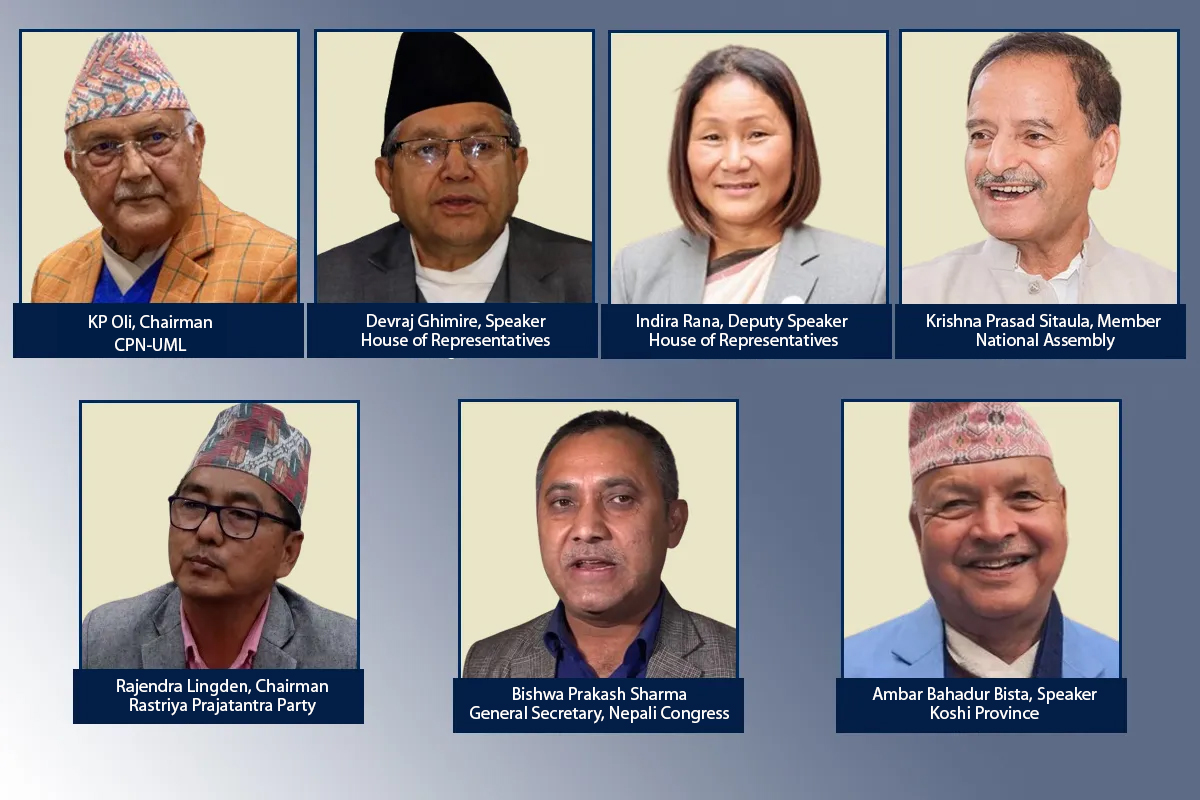KATHMANDU: The prominence of eastern Nepal in the nation’s executive and administrative realms has been profound, with districts like Jhapa and Morang participating in every democratic struggle, especially during the communist movement.
Furthermore, the legacy of Matrika Koirala, BP Koirala, and Girija Prasad Koirala — three siblings who ascended to key executive positions — has inadvertently added to the stature of Morang.
The increasing presence of individuals from Jhapa in constitutional roles and other executive positions has become a subject of considerable discourse.
Jhapa boasts 5 constituencies in the House of Representatives and 10 in the province.
Leaders emerging victorious from these constituencies have consistently risen to pivotal roles within the state, either through direct victories or via proportional representation and alliances.
Now, let’s delve into the profiles of three prominent individuals from Jhapa who have ascended to leadership roles in the country, along with one notable figure poised for a similar trajectory.
Devraj Ghimire, Speaker: A central figure in the CPN-UML, Ghimire secured a seat in the National Assembly in 2056 BS.
His victory in the House of Representatives election from Jhapa Constitueny-2 in 2079 BS culminated in his election as the Speaker on January 19, 2023.
Indira Rana Magar, Deputy Speaker: Hailing from Arjundhara Municipality in Jhapa, Magar, a member of the Rastriya Swatantra Party (RSP), assumed the role of Deputy Speaker of the House of Representatives on January 21, 2023.
Known for her advocacy for helpless and poor children, Magar entered parliament through proportional representation.
Ambar Bahadur Bista, Speaker of Koshi Province: On January 9, 2024, Bista, a member of the Rastriya Prajatantra Party (RPP) and a resident of Jhapa Gouradaha, was elected as the Speaker of Koshi Province.
Bista’s journey includes being a proportional member of parliament elected from RPP.
This rise of Jhapali leaders to influential positions reflects a shifting dynamic in the country’s political landscape, sparking discussions about the concentrated influence of eastern Nepal in the corridors of power.
Krishna Prasad Sitaula: Aspiring National Assembly Chairperson
Nepali Congress leader Krishna Prasad Sitaula from Jhapa faced defeats in the 2074 BS and 2079 BS elections against Rastriya Prajatantra (RP) Chairman Rajendra Lingden from Jhapa Constituency-3.
However, he emerged victorious in the National Assembly elections on January 25, 2024 through the Nepali Congress-Maoist Center alliance.
Sitaula now harbors aspirations to become the Chairman of the National Assembly, with indications that the ruling coalition party has consented to his candidacy.
If this unfolds, Jhapa will witness the addition of another esteemed figure to its political landscape.
Jhapali leaders pave the way for Political Influence
KP Oli, CPN-UML Chairman: KP Sharma Oli, the Chairman of the CPN-UML, hails from Damak-5 in Jhapa.
Serving as the Prime Minister three times in 2062 BS, 2072 BS, and 2074 BS, his constituency is Jhapa-5.
Oli has also held key positions such as Home Minister, Deputy Prime Minister, and Foreign Minister of Nepal.
RPP Chairman Rajendra Lingden: The Chairman of Rastriya Prajatantra Party (RPP), Rajendra Lingden, is also a resident of Haldibari, Jhapa.
Successfully elected from Jhapa Constituency-3, Lingden plays a significant role in the political landscape.
Nepali Congress General Secretary Bishwa Prakash Sharma: Bishwa Prakash Sharma, the General Secretary of Nepali Congress, resides in Jhapa Constuency- 1.
His victory in the 2079 BS election against Agni Kharel of Jhapa Constituency No. 1 representing CPN-UML highlights his political influence.
Additionally, Jhapa is home to Uddhav Thapa, the leader of the Nepali Congress Parliamentary Party of Koshi Province, and Hikmat Karki, the leader of the UML Koshi Province Parliamentary Party.
Karki’s residence is in Gauradaha, echoing the political prominence of Jhapa in the provincial landscape.
The rich political tapestry of Jhapa continues to unfold, with leaders from various parties contributing to the region’s influence on the national stage.
Population Statistics of Jhapa: A Vital Hub in Koshi Province
Jhapa stands as the primary commercial hub within Koshi Province, playing a pivotal role in the region’s economic landscape.
The total population of Jhapa is 998,054, making it the fourth most populous district in Nepal.
As per the National Census of 2078 BS, the Koshi Province boasts a population of 49,61,412.









Comment